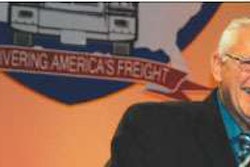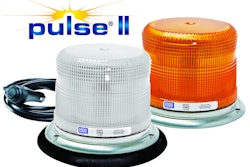 [email protected]
[email protected]The Art of Griping
Imagine you haul for Brand Name Trucking. Every day you wear a T-shirt that says on back: “I’m a prisoner of Brand Name Trucking.” Receivers see it. Shippers see it. Everyone in the truck stop, including potential recruits of BNT, sees it.
Company executives say to take it off, but you refuse and get suspended. The National Labor Relations Board intervenes, concluding you’ve got a right to express yourself, so BNT needs to leave you alone.
Sound bizarre? Substitute AT&T’s Connecticut operation and 200 pro-union employees, some of whom provided in-home customer service, and you’ve got reality.
The case was cited by labor attorney Eddie Wayland, who spoke at the annual meeting of the Truckload Carriers Association last month. In other instances, he noted, pro-union workers have demonstrated with giant inflatable rats or bedbugs to symbolize their employers.
 Pro-union workers have demonstrated with giant inflatable rats to symbolize their employers.
Pro-union workers have demonstrated with giant inflatable rats to symbolize their employers.Wayland stressed that workers are no longer limited to means of expression like T-shirts and company bulletin boards. Any worker has access to online venues that can push employer criticism to thousands of people.
One key distinction regarding free speech within trucking is that company drivers are employees. They enjoy the protections of the NLRB, which has become increasingly pro-union in its decisions, as Wayland and others note.
If you’re an independent contractor, you aren’t under NLRB’s umbrella. Should you start bad-mouthing your fleet, that fleet can cut you loose. After all, Wayland says, “There’s an inherent principle of good faith and fair dealing when you’re in a business relationship with somebody.” Every successful owner-operator we speak with understands that.
Gripefest forums such as truckstops and CB radio don’t draw the attention of fleet executives. However, truckers now can enjoy the efficiency of online forums and, more recently, Facebook, Twitter and personal blogs. Not only can their venting be more widely disseminated, it has a longer shelf life.
Still, carriers haven’t shown an eagerness to take legal action over such remarks. Indirect responses such as cutting miles or assigning bad hauls are probably more effective. For owner-operators, expressing complaints online or in other ways is fine as long as you know your rights and, ideally, know your carrier well enough to understand how far you can go.
Unfortunately, squawking to the masses usually doesn’t get a response where it’s needed. How much better to vent and accomplish something. Large, successful carriers like Landstar and Schneider National, as well as much smaller ones, such as Paramount Freight Systems (see Page 69), go to great lengths to form owner-operator councils, hear from them regularly and act upon their concerns.
Take advantage of that avenue if it’s available at your fleet. If it’s not and your complaints are serious, you might need to find a carrier that treats its contractors like partners, not prisoners.









